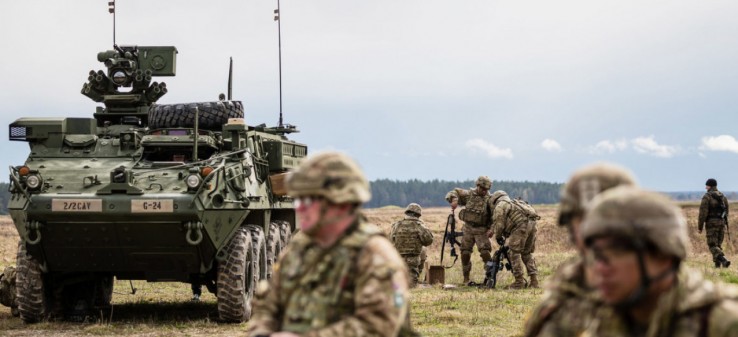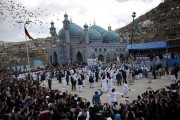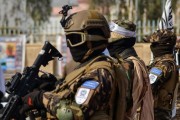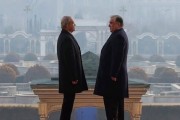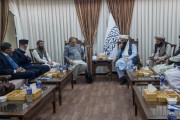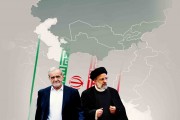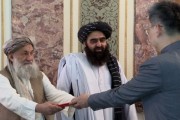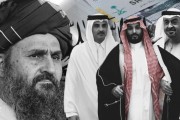Publish Date
Saturday 20 July 2024 - 11:11
recommended
0
Uzbekistan and Kazakhstan Defense Cooperation with the West: New Dimensions
Reports show that the level of military and defense cooperation of Kazakhstan and Uzbekistan with the West, especially the United States, has increased. This increase is beyond what is announced in official reports, and is caused by various drivers. First, after the start of the Ukraine war and the increase in the level of threats from Russia, these countries faced an uncertainty in their defense and military fields. Second, by imposing heavy sanctions against Russia and creating strong sensitivities even about economic interactions with Moscow, the development of military and defense cooperation with Russia has had a lot of costs for these countries. In fact, the West has tried to define any level of cooperation between these countries and Russia as an action in support of Russia and against Ukraine, creating a kind of divergence in this context.
By: IESS’ Central Asia department
Introduction
Increasing the level of defense and military cooperation between Central Asian countries and the West has been one of the visible trends after February 2022. These interactions were generally on a limited level, in the field of training and provision of small equipment, and had a non-strategic nature. The purpose of these cooperation has been to create a level of balance and diversification to defense cooperation policies of Central Asian countries.
Some new reports, however, show that there are signs of increasing defense and military cooperation between the countries of the region and the West, at deeper levels and in invisible layers. It seems that Russian sources have also publicly published data and documents related to these cooperation, with the aim of creating political restrictions on the further development of it. The existing facts show that this trend still exists and develops.
This report examines the new dimensions of the military and defense interactions of Uzbekistan and Kazakhstan with the West, and examines its implications and prospects.
Military and defense cooperation with Uzbekistan
In recent months, some documents about defense cooperation between Uzbekistan and the West have been published, in which new levels of cooperation have been mentioned. In one of these documents, an American company called Universam Technologies has submitted a request to the Ministry of Defense of Uzbekistan to purchase second-hand Russian defense systems from Uzbekistan. In this letter, systems such as Buk, S-300, BM-27 and other similar systems, and even the missiles used in them, are mentioned. The main condition for the purchase of these equipment was their good operational condition, and the company offered flexible payment terms for this purchase. In this letter, the United States government was named as the customer of the above products that were purchased by this company. The letter emphasized that as soon as the availability of this equipment in Uzbekistan is confirmed, negotiations will be held with the government regarding its funding. It seems that these defense equipment and weapons are purchased with the aim of transporting them to Ukraine, and this work is done by intermediary companies.
In another document, which is the cooperation program between CENTCOM and the Ministry of Defense of Uzbekistan, a list of bilateral defense and military cooperation programs is mentioned between October 1, 2022 and September 30, 2023. In this one-year period, there have been 63 joint military events between the two countries, with an average of one joint defense-military event every week. Some of these events were related to various CENTCOM conferences in different parts of the world, in which the officials of the Uzbekistan Ministry of Defense were also invited. At the same time, bilateral visits and events such as official visits of American officials to Uzbekistan are also mentioned in this document. Among the most important of these events are the visit of American military officials - such as the commander of the Mississippi National Guard, the commander of CENTCOM, and the commander of USAFCENT - to Tashkent, holding of various training courses in the United States and Uzbekistan, and participation in joint exercises such as Regional Cooperation 2023 and Southern Strike 23. Apart from military and defense issues, this cooperation has also included a security sector.
In the security-defense cooperation document signed at the same time between Uzbekistan and CENTCOM, a total of 37 programs were also mentioned. These programs were designed and implemented in accordance with various security centers in the United States, such as the Expanded International Military Education (E-IMET) program, the Near East South Asia Center (NESA) programs, and the George.C.Marshall Center for Security Studies (GCMC) programs. In the framework of these programs, some other side programs have also been implemented in Tashkent, with the participation of other American institutions and security centers. Among these programs are the holding of expert meetings and training courses on countering drug trafficking, tactics of police military operations, special operations against terrorism, tactics of small military units, management of training and human resources, and etc. These security meetings have given greater scope to the US-Uzbekistan military-security cooperation, which was less visible before.
Another document is a letter written by General Saltzman the chief of CENTCOM's military cooperation office, to General Hasanov the chief of the International Military Cooperation Department, which was published on July 25, 2023. This letter is about the presence of a training team and the equipment related to RQ-20B Puma drones. This shipment, coming from Tashkent airport, included two drone systems worth 1.888 million dollars. It is worth noting that the export of light and reconnaissance Puma drones to Uzbekistan was one of the controversial issues between the two countries, which was initially denied, but later the news of the delivery of 16 systems of it was published.
Another point in recent US military and defense cooperation with Uzbekistan is the exponential increase in the US military aid. While in 2018-2019 and in the first years of the Mirziyoyev government, these aids were only 218 thousand dollars, in the FY 2023 they have reached more than 16.5 million dollars. Although the actual amount of these aids may be much more than this, this level of aids also indicates the increase of these interactions to a new level.
At the same time, it should also be noted that Uzbekistan's defense and military cooperation is not only with the United States, but also includes some interactions with the United Kingdom. In another document dated July 17, 2023, the British Embassy in Tashkent invited Uzbekistan's defense officials, including 3 representatives from the Ministry of Defense and 3 representatives from the National Guard, to participate in a defense and military consultation meeting. All the costs of this meeting (including flight, hotel and other transportation costs) were borne by the British government. Among the topics of this confidential meeting are issues such as intelligence-defense reporting from Afghanistan and Ukraine, and issues related to cyber security.
The publication of such documents and the reactions that followed led to Uzbekistan and the United States reaching agreements regarding the protection of their cooperation information. The United States and Uzbekistan recently signed a document to protect their classified military information. This document was recently approved by the Senate of Uzbekistan. According to this document, from now on, many US-Uzbekistan military and defense interactions, even training courses, will be treated as classified information. This raised many reactions and questions in Uzbekistan and Russia. It seems that the signing of this document is a reaction to the recent information leaks as well as Russia's sensitivities towards this cooperation. Maintaining and improving the level of data confidentiality can also be a sign of this country's desire to improve military and defense interactions with the West and the United States.
New dimensions of defense cooperation with Kazakhstan
Until now, Kazakhstan has had a more visible level of military and defense interactions with the US and Western countries, and therefore its hidden and unknown dimensions seem to be less. However, some new documents and data related to Kazakhstan have also been published. The most important news was related to the sale of 80 or 81 Soviet-era fighter jets in an auction. The news came after Kazakhstan announced that it would sell about 117 aircraft from the 1970s and 1980s in order to modernize its air fleet. These military aircraft include MiG-31 interceptor aircraft, MiG-27 fighter, MiG-29 and Sukhoi-24 bomber.
According to the published documents, the entire auction was done at a price of about 2.26 million dollars, which means that the average price of each plane was less than 20 thousand dollars. According to some Ukrainian sources, 81 of these planes have been purchased by companies affiliated with the United States. Reportedly, the purpose of this action was to restore and repair these planes in order to join them to the Ukrainian Air Force, because the Ukrainian military forces were familiar with these planes and no longer faced problems such as their training and maintenance. Another theory was that these planes were supposed to be used as a source of spare parts for the current Ukrainian Air Force.
However, Kazspecexport which is the state-owned company of import and export of military equipment in Kazakhstan, denied this news. In its statement, the company emphasizes that foreign companies are not allowed to participate in auctions inside Kazakhstan, and that aircraft and military equipment are sold through standard processes, such as cutting and shredding, so that it is no longer possible to return them to their original state. The company emphasized that this equipment would be able to leave Kazakhstan only in the form of scrap metals. However, this theory is accompanied by doubts, due to the non-transparent structure of the tendering process in Kazakhstan. It is worth noting that some sources inside and outside of Kazakhstan have attributed the publication of this news to the existence of a false information campaign on the part of Russia, with the aim of creating more distance between Kazakhstan and the West.
Another part of the news has been about Kazakhstan's cooperation with Ukraine, using Western intermediaries. Recently, a hacker group named Bergini has leaked documents of Kazakhstan's military and technical cooperation with Ukraine. These documents were published on the eve of the visit of Denys Shmyhal, the Prime Minister of Ukraine to Kazakhstan. According to these documents, a delegation of experts in the fields of energy, metalworking, mines and aircraft repairs also accompanied Shmyhal on his visit to Kazakhstan. In these documents, some aspects of technical and military cooperation between the two countries can be seen through intermediaries in England. The publication of these documents, which was probably from Russia, is considered to be an additional pressure on Kazakhstan as the first country to receive the high-ranking Ukrainian delegation. These interactions even caused some news sources to claim that in the Ukrainian drone attack on TANECO oil refinery in Tatarstan, the drones were launched from Kazakhstan and not from Ukraine; A claim that was denied by the Kazakh authorities.
Previously, in November 2022, documents were published about a multilateral cooperation between Kazakhstan, the Zionist regime, Turkey and Azerbaijan to buy and send some military and defense equipment to Ukraine. In these documents, there were some correspondences regarding the purchase and supply of equipment such as tank engines and other armored equipment. These documents aroused a lot of speculation. After the publication of this unofficial news, along with rumors of arms exports to Russia, Tokayev's government approved a law banning arms exports.
Another dimension of defense cooperation between Kazakhstan and the United States is the issue of American biological laboratories. These laboratories have been established under Kazakhstan's extensive cooperation with the US Defense Threat Reduction Agency (DTRA). Despite Russia's protests, these laboratories continue to operate in Kazakhstan. At the same time, recently there were news about the transfer of some American biological laboratories from Ukraine to Kazakhstan, which the Kazakh authorities denied.
Incentives and implications
The evidence shows an increase in the level of military and defense cooperation of Kazakhstan and Uzbekistan with the West, especially with the United States. The level of this cooperation is beyond what is mentioned in official reports and statements. The adoption of this approach by Kazakhstan and Uzbekistan have had various reasons. First, after the start of the war in Ukraine and the increase in the level of Russian threats, these countries faced an uncertainty in the field of defense and military. Meanwhile, the territorial claims of the Pan-Slavism currents towards the North of Kazakhstan have made this issue more critical for this country. In response to this uncertainty, these countries prioritized the development of their local defense infrastructure as well as reducing their dependence on Russia in this area.
Second, with the imposition of heavy sanctions against Russia and the creation of extreme sensitivities even on economic interactions, the development of military and defense cooperation with Russia has naturally become much more expensive. The West has tried to depict any level of cooperation between these countries and Russia as an action in support of Russia and against Ukraine, thus creating some kind of divergence in this field. This issue has caused the countries of the region to look for alternatives, at least in the defense and military sectors.
The third factor is related to the desire of these countries to be close to the West and use its privileges. The fact is that Central Asia is now facing proposals and incentives from the West for cooperation in the defense and military sectors. Refusal to accept this cooperation can both deprive these countries of some privileges and impose new costs on them. Based on this, the acceptance of this cooperation by Central Asian countries can be considered inevitable.
Here the key question is how and how long will this process continue? The answer to this question lies especially in the developments in Ukraine. Despite this, both the West and Central Asian countries are well aware of Russia's tolerance threshold in this area. Russia is particularly sensitive to any defensive-military maneuvers of an offensive nature, and will not tolerate a change in these interactions at the strategic level. A look at Russia's reactions to American biological laboratories in the region, or Washington's efforts to establish a military presence in Central Asia - even with a monitoring mission - clearly proves it.
In such a context, the West has started an increasingly erosive process, and seemingly it does not intend to strongly provoke Russia, at least in the current period. But this does not mean that the West does not provoke Russia, and does not try to create tension in Moscow's relations with Central Asian countries. The disclosure of parts of the secret cooperation between Central Asian countries and the United States was probably done by the United States itself. In fact, through the release of some non-sensitive data, Washington is trying to provoke tough reactions from Moscow in various ways, in order to create a trend of increasing divergence. At the same time, in a similar approach, Russia seems to be magnifying some parts of this defense-military cooperation, in order to impose a tactical retreat on the West.
This competitive process is the most important feature of the current context, which makes the situation remain unchanged and, of course, gradually move towards the west. The desire of Central Asian countries to keep secret their military and defense cooperation with the West, and the possible and gradual increase of this cooperation in non-strategic sectors, is a process that can have strategic results in the next three to five years. In this regard, some actions can be predicted for the future, as follows: an increase in the activities of NATO-affiliated forces in the region; The penetration of Western intelligence networks into the military bodies of the region; Western interventions in new military appointments, and the appointment of aligned people; The change of some Russian combat standards by the countries of the region, and their transition to NATO standards - a movement that creates new interdependencies, and possibly leads to the participation of some Central Asian military forces in Western and NATO-led operations in bilateral or international frameworks.
Introduction
Increasing the level of defense and military cooperation between Central Asian countries and the West has been one of the visible trends after February 2022. These interactions were generally on a limited level, in the field of training and provision of small equipment, and had a non-strategic nature. The purpose of these cooperation has been to create a level of balance and diversification to defense cooperation policies of Central Asian countries.
Some new reports, however, show that there are signs of increasing defense and military cooperation between the countries of the region and the West, at deeper levels and in invisible layers. It seems that Russian sources have also publicly published data and documents related to these cooperation, with the aim of creating political restrictions on the further development of it. The existing facts show that this trend still exists and develops.
This report examines the new dimensions of the military and defense interactions of Uzbekistan and Kazakhstan with the West, and examines its implications and prospects.
Military and defense cooperation with Uzbekistan
In recent months, some documents about defense cooperation between Uzbekistan and the West have been published, in which new levels of cooperation have been mentioned. In one of these documents, an American company called Universam Technologies has submitted a request to the Ministry of Defense of Uzbekistan to purchase second-hand Russian defense systems from Uzbekistan. In this letter, systems such as Buk, S-300, BM-27 and other similar systems, and even the missiles used in them, are mentioned. The main condition for the purchase of these equipment was their good operational condition, and the company offered flexible payment terms for this purchase. In this letter, the United States government was named as the customer of the above products that were purchased by this company. The letter emphasized that as soon as the availability of this equipment in Uzbekistan is confirmed, negotiations will be held with the government regarding its funding. It seems that these defense equipment and weapons are purchased with the aim of transporting them to Ukraine, and this work is done by intermediary companies.
In another document, which is the cooperation program between CENTCOM and the Ministry of Defense of Uzbekistan, a list of bilateral defense and military cooperation programs is mentioned between October 1, 2022 and September 30, 2023. In this one-year period, there have been 63 joint military events between the two countries, with an average of one joint defense-military event every week. Some of these events were related to various CENTCOM conferences in different parts of the world, in which the officials of the Uzbekistan Ministry of Defense were also invited. At the same time, bilateral visits and events such as official visits of American officials to Uzbekistan are also mentioned in this document. Among the most important of these events are the visit of American military officials - such as the commander of the Mississippi National Guard, the commander of CENTCOM, and the commander of USAFCENT - to Tashkent, holding of various training courses in the United States and Uzbekistan, and participation in joint exercises such as Regional Cooperation 2023 and Southern Strike 23. Apart from military and defense issues, this cooperation has also included a security sector.
In the security-defense cooperation document signed at the same time between Uzbekistan and CENTCOM, a total of 37 programs were also mentioned. These programs were designed and implemented in accordance with various security centers in the United States, such as the Expanded International Military Education (E-IMET) program, the Near East South Asia Center (NESA) programs, and the George.C.Marshall Center for Security Studies (GCMC) programs. In the framework of these programs, some other side programs have also been implemented in Tashkent, with the participation of other American institutions and security centers. Among these programs are the holding of expert meetings and training courses on countering drug trafficking, tactics of police military operations, special operations against terrorism, tactics of small military units, management of training and human resources, and etc. These security meetings have given greater scope to the US-Uzbekistan military-security cooperation, which was less visible before.
Another document is a letter written by General Saltzman the chief of CENTCOM's military cooperation office, to General Hasanov the chief of the International Military Cooperation Department, which was published on July 25, 2023. This letter is about the presence of a training team and the equipment related to RQ-20B Puma drones. This shipment, coming from Tashkent airport, included two drone systems worth 1.888 million dollars. It is worth noting that the export of light and reconnaissance Puma drones to Uzbekistan was one of the controversial issues between the two countries, which was initially denied, but later the news of the delivery of 16 systems of it was published.
Another point in recent US military and defense cooperation with Uzbekistan is the exponential increase in the US military aid. While in 2018-2019 and in the first years of the Mirziyoyev government, these aids were only 218 thousand dollars, in the FY 2023 they have reached more than 16.5 million dollars. Although the actual amount of these aids may be much more than this, this level of aids also indicates the increase of these interactions to a new level.
At the same time, it should also be noted that Uzbekistan's defense and military cooperation is not only with the United States, but also includes some interactions with the United Kingdom. In another document dated July 17, 2023, the British Embassy in Tashkent invited Uzbekistan's defense officials, including 3 representatives from the Ministry of Defense and 3 representatives from the National Guard, to participate in a defense and military consultation meeting. All the costs of this meeting (including flight, hotel and other transportation costs) were borne by the British government. Among the topics of this confidential meeting are issues such as intelligence-defense reporting from Afghanistan and Ukraine, and issues related to cyber security.
The publication of such documents and the reactions that followed led to Uzbekistan and the United States reaching agreements regarding the protection of their cooperation information. The United States and Uzbekistan recently signed a document to protect their classified military information. This document was recently approved by the Senate of Uzbekistan. According to this document, from now on, many US-Uzbekistan military and defense interactions, even training courses, will be treated as classified information. This raised many reactions and questions in Uzbekistan and Russia. It seems that the signing of this document is a reaction to the recent information leaks as well as Russia's sensitivities towards this cooperation. Maintaining and improving the level of data confidentiality can also be a sign of this country's desire to improve military and defense interactions with the West and the United States.
New dimensions of defense cooperation with Kazakhstan
Until now, Kazakhstan has had a more visible level of military and defense interactions with the US and Western countries, and therefore its hidden and unknown dimensions seem to be less. However, some new documents and data related to Kazakhstan have also been published. The most important news was related to the sale of 80 or 81 Soviet-era fighter jets in an auction. The news came after Kazakhstan announced that it would sell about 117 aircraft from the 1970s and 1980s in order to modernize its air fleet. These military aircraft include MiG-31 interceptor aircraft, MiG-27 fighter, MiG-29 and Sukhoi-24 bomber.
According to the published documents, the entire auction was done at a price of about 2.26 million dollars, which means that the average price of each plane was less than 20 thousand dollars. According to some Ukrainian sources, 81 of these planes have been purchased by companies affiliated with the United States. Reportedly, the purpose of this action was to restore and repair these planes in order to join them to the Ukrainian Air Force, because the Ukrainian military forces were familiar with these planes and no longer faced problems such as their training and maintenance. Another theory was that these planes were supposed to be used as a source of spare parts for the current Ukrainian Air Force.
However, Kazspecexport which is the state-owned company of import and export of military equipment in Kazakhstan, denied this news. In its statement, the company emphasizes that foreign companies are not allowed to participate in auctions inside Kazakhstan, and that aircraft and military equipment are sold through standard processes, such as cutting and shredding, so that it is no longer possible to return them to their original state. The company emphasized that this equipment would be able to leave Kazakhstan only in the form of scrap metals. However, this theory is accompanied by doubts, due to the non-transparent structure of the tendering process in Kazakhstan. It is worth noting that some sources inside and outside of Kazakhstan have attributed the publication of this news to the existence of a false information campaign on the part of Russia, with the aim of creating more distance between Kazakhstan and the West.
Another part of the news has been about Kazakhstan's cooperation with Ukraine, using Western intermediaries. Recently, a hacker group named Bergini has leaked documents of Kazakhstan's military and technical cooperation with Ukraine. These documents were published on the eve of the visit of Denys Shmyhal, the Prime Minister of Ukraine to Kazakhstan. According to these documents, a delegation of experts in the fields of energy, metalworking, mines and aircraft repairs also accompanied Shmyhal on his visit to Kazakhstan. In these documents, some aspects of technical and military cooperation between the two countries can be seen through intermediaries in England. The publication of these documents, which was probably from Russia, is considered to be an additional pressure on Kazakhstan as the first country to receive the high-ranking Ukrainian delegation. These interactions even caused some news sources to claim that in the Ukrainian drone attack on TANECO oil refinery in Tatarstan, the drones were launched from Kazakhstan and not from Ukraine; A claim that was denied by the Kazakh authorities.
Previously, in November 2022, documents were published about a multilateral cooperation between Kazakhstan, the Zionist regime, Turkey and Azerbaijan to buy and send some military and defense equipment to Ukraine. In these documents, there were some correspondences regarding the purchase and supply of equipment such as tank engines and other armored equipment. These documents aroused a lot of speculation. After the publication of this unofficial news, along with rumors of arms exports to Russia, Tokayev's government approved a law banning arms exports.
Another dimension of defense cooperation between Kazakhstan and the United States is the issue of American biological laboratories. These laboratories have been established under Kazakhstan's extensive cooperation with the US Defense Threat Reduction Agency (DTRA). Despite Russia's protests, these laboratories continue to operate in Kazakhstan. At the same time, recently there were news about the transfer of some American biological laboratories from Ukraine to Kazakhstan, which the Kazakh authorities denied.
Incentives and implications
The evidence shows an increase in the level of military and defense cooperation of Kazakhstan and Uzbekistan with the West, especially with the United States. The level of this cooperation is beyond what is mentioned in official reports and statements. The adoption of this approach by Kazakhstan and Uzbekistan have had various reasons. First, after the start of the war in Ukraine and the increase in the level of Russian threats, these countries faced an uncertainty in the field of defense and military. Meanwhile, the territorial claims of the Pan-Slavism currents towards the North of Kazakhstan have made this issue more critical for this country. In response to this uncertainty, these countries prioritized the development of their local defense infrastructure as well as reducing their dependence on Russia in this area.
Second, with the imposition of heavy sanctions against Russia and the creation of extreme sensitivities even on economic interactions, the development of military and defense cooperation with Russia has naturally become much more expensive. The West has tried to depict any level of cooperation between these countries and Russia as an action in support of Russia and against Ukraine, thus creating some kind of divergence in this field. This issue has caused the countries of the region to look for alternatives, at least in the defense and military sectors.
The third factor is related to the desire of these countries to be close to the West and use its privileges. The fact is that Central Asia is now facing proposals and incentives from the West for cooperation in the defense and military sectors. Refusal to accept this cooperation can both deprive these countries of some privileges and impose new costs on them. Based on this, the acceptance of this cooperation by Central Asian countries can be considered inevitable.
Here the key question is how and how long will this process continue? The answer to this question lies especially in the developments in Ukraine. Despite this, both the West and Central Asian countries are well aware of Russia's tolerance threshold in this area. Russia is particularly sensitive to any defensive-military maneuvers of an offensive nature, and will not tolerate a change in these interactions at the strategic level. A look at Russia's reactions to American biological laboratories in the region, or Washington's efforts to establish a military presence in Central Asia - even with a monitoring mission - clearly proves it.
In such a context, the West has started an increasingly erosive process, and seemingly it does not intend to strongly provoke Russia, at least in the current period. But this does not mean that the West does not provoke Russia, and does not try to create tension in Moscow's relations with Central Asian countries. The disclosure of parts of the secret cooperation between Central Asian countries and the United States was probably done by the United States itself. In fact, through the release of some non-sensitive data, Washington is trying to provoke tough reactions from Moscow in various ways, in order to create a trend of increasing divergence. At the same time, in a similar approach, Russia seems to be magnifying some parts of this defense-military cooperation, in order to impose a tactical retreat on the West.
This competitive process is the most important feature of the current context, which makes the situation remain unchanged and, of course, gradually move towards the west. The desire of Central Asian countries to keep secret their military and defense cooperation with the West, and the possible and gradual increase of this cooperation in non-strategic sectors, is a process that can have strategic results in the next three to five years. In this regard, some actions can be predicted for the future, as follows: an increase in the activities of NATO-affiliated forces in the region; The penetration of Western intelligence networks into the military bodies of the region; Western interventions in new military appointments, and the appointment of aligned people; The change of some Russian combat standards by the countries of the region, and their transition to NATO standards - a movement that creates new interdependencies, and possibly leads to the participation of some Central Asian military forces in Western and NATO-led operations in bilateral or international frameworks.
News code:3772




